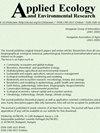利用散弹枪宏基因组分析评价无烟烟草制品细菌多样性
IF 0.6
4区 环境科学与生态学
Q4 ECOLOGY
引用次数: 0
摘要
。纳斯瓦尔是一种无烟烟草产品,通常在巴基斯坦和阿富汗的普什图人消费。尽管纳斯瓦尔是口腔癌的已知危险因素,但人们对其微生物成分知之甚少。目的:本研究的目的是利用霰弹枪宏基因组测序技术探索纳斯瓦尔细菌的多样性。方法:采用酶解和机械裂解法提取12个(n = 12)名牌Naswar样品的DNA,并在Illumina Miseq平台上进行下一代测序。结果:纳斯瓦尔样品在各分类水平上均表现出不同的丰度分布,其中Khamar品牌的物种丰富度和多样性指数最高。22门中以变形菌门最多(88.4%),其次是拟杆菌门(4.71%)和厚壁菌门(3.73%)。在属水平上共鉴定出234个属(范围:32 ~ 132)。宏基因组测序还显示在纳斯瓦尔样品中存在455种(范围:44 - 210)不同的细菌种类。最常见的菌种为金黄色假单胞菌、小肠结肠炎耶尔森菌、肠炎沙门氏菌、油菜黄单胞菌和大肠杆菌。其中一些物种因其在人类中引起感染的能力而引起关注。结论:纳斯瓦尔产品含有丰富的菌群,在门、属和种水平上具有不同的丰度。这些发现可能对进一步研究探索与微生物有关的健康风险并提供科学证据,为巴基斯坦纳斯瓦尔的生产和测试的潜在法规提供信息具有若干影响。本文章由计算机程序翻译,如有差异,请以英文原文为准。
EVALUATING THE BACTERIAL DIVERSITY OF SMOKELESS TOBACCO PRODUCT USING SHOTGUN METAGENOMIC ANALYSIS
. Naswar is a smokeless tobacco product, commonly consumed in Pashtun population of Pakistan and Afghanistan. Despite being an established risk factor for oral cancer, not much is known about microbiological constituents of Naswar. Objectives: The objective of the study was to explore bacterial diversity in Naswar using shotgun metagenomic sequencing. Methodology: DNA was extracted from twelve (n = 12) famous brands of Naswar samples using an enzymatic and mechanical lysis method followed by next generation sequencing on Illumina Miseq platform. Results: Naswar samples exhibits differential abundance profile at all taxonomic levels with Khamar brand having the highest species richness and diversity indices. Of the total 22 phyla identified, phylum Proteobacteria was the most abundant (88.4%) followed by Bacteroidetes (4.71%) and Firmicutes (3.73%). At genus level, 234 genera (range: 32 – 132) were identified. Metagenomic sequencing also revealed presence of 455 (range: 44 – 210) different bacterial species in Naswar samples. The most common species were Pesudomonas aurgenosa , Yersinia enterocolitica , Salmonella enterica , Xanthomonas campestris , and E. coli . Some of the species are of concern due their ability to cause infections in humans. Conclusions: Naswar products harbor diverse bacterial microbiota with differential abundance at phylum, genus and species level. These findings may have several implications in terms of further research to explore microbiological associated health risks and provide scientific evidence to inform potential regulations regarding manufacturing and testing of Naswar in Pakistan.
求助全文
通过发布文献求助,成功后即可免费获取论文全文。
去求助
来源期刊

Applied Ecology and Environmental Research
ECOLOGY-ENVIRONMENTAL SCIENCES
CiteScore
1.40
自引率
14.30%
发文量
104
审稿时长
14 months
期刊介绍:
The Journal publishes original research papers and review articles. Researchers from all countries are invited to publish pure or applied ecological, environmental, biogeographical, zoological, botanical, paleontological, biometrical-biomathematical and quantitative ecological or multidisciplinary agricultural research of international interest on its pages.
The focus is on topics such as:
-Community, ecosystem and global ecology-
Biometrics, theoretical- and quantitative ecology-
Multidisciplinary agricultural and environmental research-
Sustainable and organic agriculture, natural resource management-
Ecological methodology, monitoring and modeling-
Biodiversity and ecosystem research, microbiology, botany and zoology-
Biostatistics and modeling in epidemiology, public health and veterinary-
Earth history, paleontology, extinctions, biogeography, biogeochemistry-
Conservation biology, environmental protection-
Ecological economics, natural capital and ecosystem services-
Climatology, meteorology, climate change, climate-ecology.
The Journal publishes theoretical papers as well as application-oriented contributions and practical case studies. There is no bias with regard to taxon or geographical area. Purely descriptive papers (like only taxonomic lists) will not be accepted for publication.
 求助内容:
求助内容: 应助结果提醒方式:
应助结果提醒方式:


